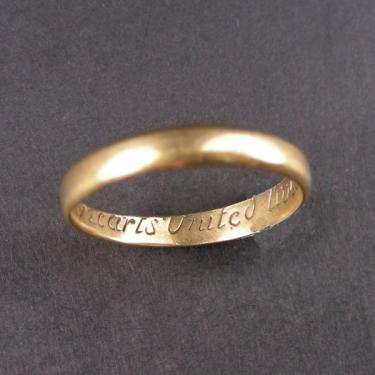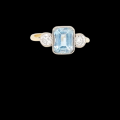DB Gems
Posy ring English circa 1700
SKU: 327
"Hearts united lives contented" makers mark SD. size M. Width 2.9mm
Posie rings (sometimes spelled "posy ", "posey" or "poesy rings") are finger rings with short inscriptions on their outer surfaces. More rarely the inscription is on the inner surface.
A posey ring or love ring, is a simple gold band engraved with a brief sentiment or poem on the outside. They were used as a lover's token, a wedding ring, or simply as a means of showing regard or giving a gift.
Popular during the 15th, 16th, and 17th centuries in England and France as lovers gifts, the Ashmolean Museum in Oxford, England has an outstanding collection. Recently jewelery designers such as Victoria Buckley Jewellery have led a resurgence of interest in the tradition. The Victoria and Albert museum in London also has a good collection bequeathed by Joan Evans, daughter of a famous 19th century collector. She compiled a list of more than 3000 posies for her book 'English Posies and Posy Rings' (oxford Press 1931, out of print)
The language used in many early posy rings was Norman French, with French, Latin and English used in later times. The posies were originally written on the outside, moving to the hidden inside of the ring in later (mid 16th Century onwards) times.
Here is a list of poesy phrases used in past centuries and the museums where the original rings can be found. These are accurate to the original spellings.
SOLD
"never to change" British Museum 16th or 17th century
"love is enough" Victoria & Albert Museum 19th century
"hope is the life of love" British Museum 16th or 17th century
"yours onli" British Museum 16th or 17th century
"all I refuse and thee I chuse" Fitzwilliam Museum -University of Cambridge 16th Century
"faithles to none yet faithful to one" British Museum 16th to 17th century
"forget me not" National Museum of Ireland
"in thy brest my heart doth rest" British Museum 16th or 17th century
"no joy compared to hart's content" British Museum 17th century
"many are the starrs I see but in my eye no starr like thee" British Museum 16th century
Material
- Gold










